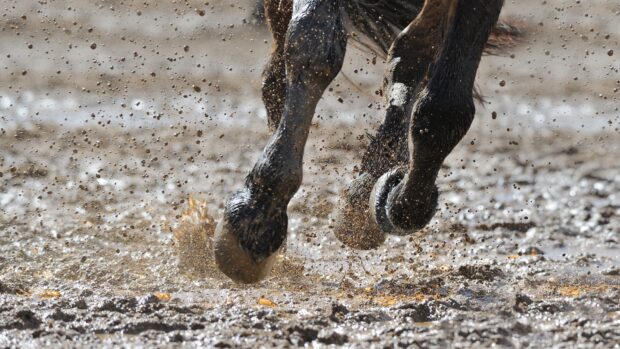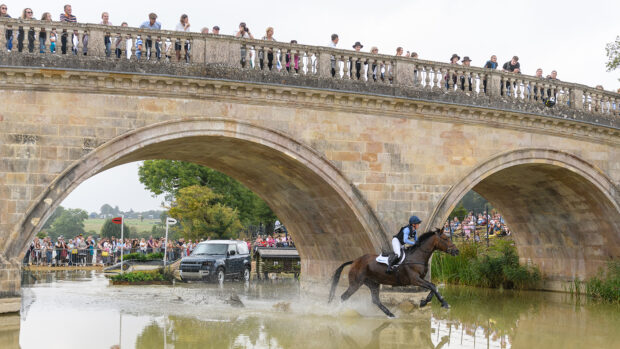Eric Smiley, a four-time Olympian for Ireland and a European medallist in eventing, on why keeping a horse’s record spotless shouldn’t be riders’ priority
I DIDN’T want the horse to pick up 20 penalties across country, but that’s what happened. On the drive home, I tried to consider the implications of the 20 penalties on his record.
After all, it was only a momentary lapse in his concentration – it wasn’t done out of badness. He was only seven years old and still learning. I felt he was going so well that I trusted him like an advanced horse. I probably could have got him over it to avoid the 20 if I had ridden him like a stopper, but that doesn’t really work long term.
Happy to be there
EVERY competition is divided into three groups – those who are satisfied just to be there, those who are there to complete and those who are there to compete.
Whichever group suits the mindset of the rider is probably where you will end up. The top third believe they can be competitive and are more than likely to be placed. The next group can be hit and miss, but tend not to interfere with group one.
It’s the group who are happy just to be there that causes the headaches. No matter what qualification restrictions are placed on entry to the next level, people seem to find a way around them.
“My son has ridden at Badminton, you know,” says the proud father. Don’t ask how he got on, because he fell at the first combination. The other 60 competitors probably knew something like that would happen because they wondered how he qualified. The truth was that he travelled the country to events that were just below par for the level and “hunted” round to gain an MER (minimum eligible requirement).
The course-designers know this now and try to get these riders out of the competition early before the horse gets tired or anything disastrous happens. It is a difficult situation to legislate for and the sport is continually looking at how combinations can be allowed to move up to the next level and be ready for it.
I knew with my horse because I listened to what he told me, which was, “I’m still learning, give me more runs and I’ll learn to do better.” But not everyone takes the same view on the education of young horses as I do.
Dominant riding
THERE is a commercial side to this subject. Horses’ track records are readily available. A perfectly clean record looks good and is easier to sell than my horse with its one stop. No matter how hard I try to talk it away, yes, he did run out.
Riders who ensure horses go clear are very often over-dominant in their riding. The horse is left with no doubt that they must get to the other side no matter what. In doing so, the horse’s education is so often overlooked – instead, it’s, “Do what I say because that’s what I say.” That’s not great for the partnership and eventually swings the influence too heavily towards the rider making decisions.
Good cross-country horses are those that enjoy the challenge, relish showing their training and take decisions when the rider slips up, which we all do. They can only do this if given responsibility through their training to learn what to do and are given appropriate challenges to learn the tools of their trade and demonstrate that they have achieved the level.
I’m often asked, “When should I move my horse up?” My answer is, “When the level you are at seems straightforward.”
Horses and riders need to expose themselves to training that allows both parties to learn their skills. Risk making mistakes and learn how to avoid them next time by more or better training or different riding. Only think of going to competitions when you have the mindset of the middle or top group.
Incidentally, I never did sell my horse. I could never convince anyone he’d one day be one of the best cross-country horses in the sport. Easily clear inside the time at Badminton on many occasions, two Olympic Games, two European medals and so…
- This exclusive column will also be available to read in Horse & Hound magazine, on sale Thursday 9 June
You may also be interested in…

Eric Smiley: training young event horses to jump safely and confidently
Take a look at top jumping coach Eric Smiley's 14 tips for teaching a young event horse to jump

‘Why cross-country becomes dangerous’ — the indisputable link between bitting and falls

‘I heard my ankle crack’ – rider makes remarkable comeback for international success 10 weeks after fall

Subscribe to Horse & Hound magazine today – and enjoy unlimited website access all year round
Horse & Hound magazine, out every Thursday, is packed with all the latest news and reports, as well as interviews, specials, nostalgia, vet and training advice. Find how you can enjoy the magazine delivered to your door every week, plus options to upgrade your subscription to access our online service that brings you breaking news and reports as well as other benefits.




